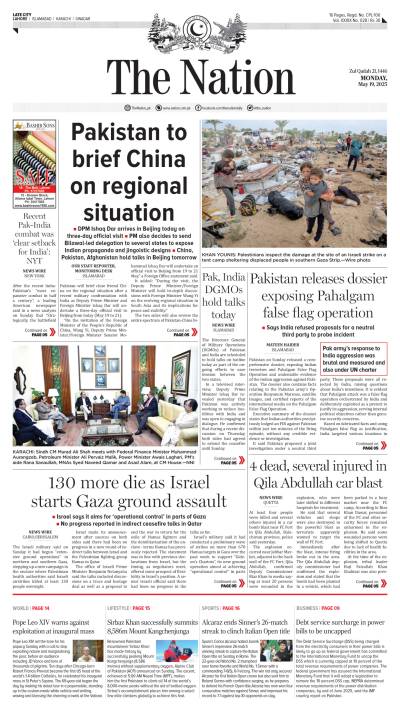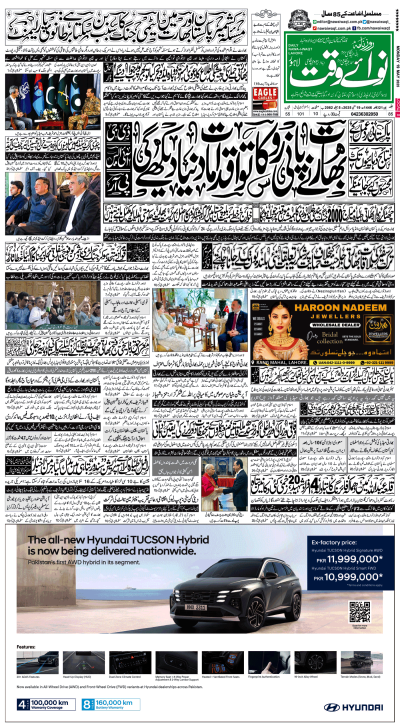One major negative for sitting governments all over the world is that they invariably fall victim to the disadvantage of incumbency. No matter how good and imaginative their policies are, there are always people out there who consider it their sacred duty to cavil at them and make a conscious effort to ferret out inadequacies in those initiatives out of context. The other disadvantage is that incumbent governments for some inexplicable reason suffer from a lack of credibility. The combination of these factors makes it really difficult for the governments to defend their policy options. This phenomenon is more pronounced in developing countries as compared to developed nations. Pakistan is quintessential of this affliction.
The political parties, even at the cost of national interests continue to undermine the sitting government, instead of playing the role of a responsible opposition and contributing to the task of nation building; a responsibility that they are supposed to undertake in a democratic dispensation. There is no denying the fact that they have the right to be critical of government policies but that right also obligates them to do it with a constructive outlook and honesty of purpose.
Similarly the media, while relishing its new found independence is highly polarized and excessively engaged in speculative reporting and comments, blowing things out of proportion, reading far too much between the lines and making interpretations out of context for political and other developments.
This behavior is against ethical and professional codes of conduct drawn up by media representative bodies all over the world. All of them invariably emphasize the need for truthful reporting and refraining from feeding their readers speculation; the aspect which relates to social responsibility of the media.
Perhaps it would not be out of place to give a few examples in this regard. The basic principle for a free and responsible press enunciated by the Social Responsibility Theory, propounded by Dr. Hutchison reads, “The media should provide accurate and truthful, comprehensive and intelligent account of day’s events in a context that gives them meaning.” Similarly the first principle of the code of ethics adopted by Society Of Professional Journalists of USA also says “Seek Truth and report it.” Article IV of the statement of principles adopted by the American Society of Newspaper editors says, “Good faith with the reader is the foundation of good journalism. Every effort must be made to assure that the news content is accurate, free from bias and in context, and that all sides are represented fairly. Editorials, analytical articles and commentary should be held to the same standard of accuracy with respect to facts as new reports.”
A myriad of examples can be quoted where the media has acted in an irresponsible manner in violation of ethical and profession codes. When operation Zarb-e-Azab was launched, the media was deluded with reports rubbing in the notion that it had been started by the Army on its own initiative. Even well reputed media commentators following the lead went out of their way to reinforce that impression. However, the statement issued by the ISPR saying that the operation had been launched on the orders of the government exploded the myth. It was a classic example of speculative reporting. Another incident worth mentioning is the announcement by the government to call out the Army for the assistance of the civil administration to protect Islamabad against possible retaliatory strikes in the wake of Zarb-e-Azab. In the midst of the controversy over the government move in this regard, a private TV channel reported that the government had decided to rescind its decision to seek Army’s assistance. The report was immediately contradicted by the Interior minister at a press conference in the evening. The reporter ostensibly relied on a single source to break the news without verifying its accuracy; an embarrassing indiscretion.
The PPP and many media stalwarts are critical of the initiative to call in the army and attribute it to the failure of the government in dealing with the security situation. It is trying to take advantage of the problems confronting the government to reap political mileage out of it instead of appreciating the situation in its proper context. The PPP is the party which has been using article 245 to seek assistance of the Army to control volatile law and order situations. This article, as the interior minister revealed, has been invoked 11 times since 2007. The government decision to call out the army is therefore within the ambit of law and constitution and the SC ruling on the subject has already accepted the right of the government in this regard. The argument that the government has failed to deal with the situation and should have relied on the police and other paramilitary forces to deal with any eventuality in Islamabad, pales in view of the fact that the terrorists have even hit GHQ, Mehran Base and Kamra Aeronautial Complex, the most heavily guarded and secured installations. The threat is too grave to be left to the civil administration. Islamabad is the capital of the nation and must be protected at all costs. The minister also quashed the argument that this step had been taken to drag the army into politics and thwart Imran’s tsunami march. His assertion that the decision to call the army was taken when the decision to launch Zarb-e-Azab was made in consultation with the Army top brass, sounds quite credible. Imran’s rally is definitely a side issue and not an overriding consideration in calling out the Army. I think Imran should postpone his rally till the end of Operation Zarb-e-Azab by preferring the bigger national cause over his political interests. He must respect the sanctity of Independence Day.
The writer is a freelance columnist.
ashpak10@gmail.com





